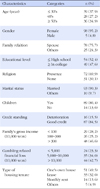Abstract
Purpose
This study was done to identify levels of family function, codependency, depression, and self-esteem, and to identify factors influencing family function in families pathological gamblers.
Methods
A cross-sectional survey design was used. Participants in the survey for this study were 103 families pathological gamblers from gambling counseling G center in Gyung-gi province. Data were collected from January to December, 2012 using self-report structured questionnaires. Data were analyzed using t-test, ANOVA, Pearson correlation coefficients and Stepwise regression with SAS program.
Results
Codependency, depression, self-esteem and family function showed strong correlations (p<.001). Family status, type of housing tenure, codependency and self-esteem were identified as factors influencing family function in families pathological gamblers. These variables explained 27% of family function.
References
1. American Psychiatric Association. diagnostic and statistical manual of mental disorders. 5th edition. Arlington, VA: American Psychiatric Publishing Inc.;2013.
2. Lorenz VC, Yaffee RA. Pathological gambling: psychosomatic, emotional and marital difficulties as reported by the spouse. J Gambling Behav. 1988; 4(1):13–26.

3. Black DW, Shaw MC, McCormick BA, Allen J. Marital status, childhood maltreatment, and family dysfunction: a controlled study of pathological gambling. J Clin Psychiatry. 2012; 73(10):1293–1297. DOI: 10.4088/JCP.12m07800.
4. Hong JA, Yang S. Effects of the family education program for pathological gambler's family. J Korean Acad Nurs. 2013; 43(4):497–506. DOI: 10.4040/jkan.2013.43.4.497.

5. Hosseinbor M, Bakhshani NM, Shakiba M. Family functioning of addicted and non-addicted individuals: a comparative study. Int J High Risk Behav Addict. 2012; 1(3):109–114.

6. Cho HS, Woo JI, So IY, Moon YS, Lee HR, Kim JS. Analysis of factors correlated with the family function of alcoholics and their family. J Korean Acad Fam Med. 1994; 15(12):1088–1107.
7. Han YO, Jeong JY, Kim HW. Preliminary study for developing of pathological gambler's family intervention program. Korean J Health Psychol. 2011; 16(2):263–277.

8. Nicki D, David S, Trang T. The family functioning of female pathological gamblers. Int J Ment Health Addict. 2009; 7(1):29–44. DOI: 10.1007/s11469-007-9126-0.

9. Lee JS. A study on the development and effectiveness of a coping skill improvement program for significant family members of alcoholics [dissertation]. [Seoul]: Ewha Womans University;2004. 143.
10. Smith JE, Meyers RJ.
CY Yoo
SY Park
HI Son
. Motivating substance abusers to enter treatment. 1st ed. New York: The Guilford Press;2004. p. 464.
11. Mulry JT. Codependency: a family addiction. Am Fam Physician. 1987; 35(4):215–219.
12. Lee KW. A study of the degree of codependency, self-esteem, and the health condition of the wives of alcoholic husbands. Hyejeon;2002. 17:p. 189–224.
13. Shin KC, Choi YS, Park EJ, Choi YS, Chung SY, Kim SH. Research for family treatment program of pathological gambler. Seoul: The National Gambling Control Commission of Korea;2010. 12.
14. Mazzoleni MH, Gorenstein C, Fuentes D, Tavares H. Wives of pathological gamblers: personality traits, depressive symptoms and social adjustment. Rev Bras Psiquiatr. 2009; 31(4):332–337.

15. Seo JE, Kim HJ. Influences of family functioning: a meta-analysis. Korean J Fam Ther. 2012; 20(3):457–486.
16. Noller P, Seith-Smith M, Bouma R, Schweitzer R. Parent and adolescent perceptions of family functioning: a comparison of clinic and non-clinic families. J Adolesc. 1992; 15:101–114.

17. Kitchens JA. Understanding and treating co-dependence. Englewood Cliffs, NJ.: rentice Hall;1991. p. 89–90.
18. Kim HJ, Chang HI, Kim KB. Development and standardization of Korean version of a codependence test. J Korean Acad Addict Psychiatry. 1999; 3(2):148–158.
19. Kim MA, Lee IS, Lee CS. The validation study I of Korean BDI-II: in female university students sample. Korean J Clin Psychol. 2007; 26(4):997–1014.
20. Rosenberg M. Society and adolescent self-image. Princeton, New Jersey: Princeton University Press;1965.
21. Ciarrocchi JW. Counselling problem gamblers: A self-regulation manual for individual and family therapy. 1st ed. San Diego: Academic Press;2001. p. 339.
22. Lee HK, Lee MS. Residental type and subjective quality of life. Korean J Psychol Soc Issues. 1997; 3(1):97–105.
23. Park SB. Residential factors and life satisfaction of the elderly. Korean Public Adm Q. 2011; 23(3):731–758.
24. Henderson JV, Ioannides YM. A model of housing tenure choice. Am Econ Rev. 1983; 73(1):98–113.
25. Kim HK, Hong MH, Cho SH, Kwak DI. A comparative study of the level of family function and emotional status between control and neurotic group. J Korean Acad Fam Med. 1988; 9(6):12–26.
26. Lee HJ, Kim WH. An impact of the parental burden on quality of life of disabled adolescents' parents: the mediating effect of family communication and family functioning. J Rehabil Res. 2011; 15(20):131–153.
27. Yang S, Lee SY, Cha JK. Effects of imago psychotherapy on co-dependency and mental health in wives of alcoholics. J Korean Acad Psychiatr Ment Health Nurs. 2005; 14(3):313–322.
28. Copello A, Orford J. Addiction and the family: is it time for services to take notice of the evidence? Addiction. 2002; 97:1361–1363.

29. Kim TH, Lee YJ. The effects of perceived parent-adolescent communication, family function on self-esteem on adolescent. J Fam Relat. 2005; 10(3):173–193.




 PDF
PDF ePub
ePub Citation
Citation Print
Print







 XML Download
XML Download